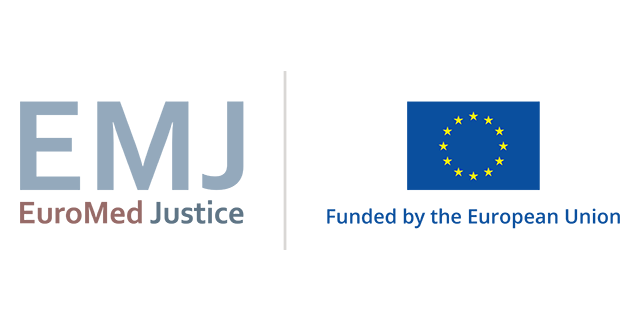14 – 15 September 2021
The 13th CrimEx regular session is organised from The Hague, Netherlands, via videoconference on Zoom Pro online platform due to the ongoing restrictions related to Covid 19.
Objectives
CrimEx 12th regular sessions will address:
- Agreement on the conclusions of CrimEx 12 meeting
- Discussions on:
- Update of EMJ tools and development of the 6 new tools – developments and current status;
- EMJNet (EuroMed Justice Network of contact points) – Modalities and setting up of the EMJNet; organisation and activities; setting up a sub-group on cybercrime; EMJ Directory of contact points – update;
- Training component – Information regarding the training provider selected to implement the training component;
- TAF (Technical assistance facility) – current status and proposals;
- 3rd PG Forum (Prosecutors General Forum) – topics, strategic and policy documents, analyse of statistical data, sustainability;
- Brief update on statistical data.
Programme
Tuesday 14 September 2021 – First Day
09.00
Online connection, participants calling in
Chair: Representative of Morocco
Vice-chair: Representative of France
09.30
Opening and Welcome
Tour de table
- CrimEx members will present information regarding developments made between CrimEx 12 and CrimEx 13 relevant for the EuroMed Justice (legislative, procedures, trainings, agreements etc.);
- EU Agencies, international Organisations and other partner projects will present latest developments (framework, legislative, capacity building, events) relevant for EMJ and its stakeholders;
- M. Spieza, Chair of the Anti-Trafficking Team at Eurojust, will present the Focus Group of prosecutors and judges fighting migrant smuggling (supported by Eurojust) and address the issue of direct contact among the judicial authorities (EU Member States and SPCs)
- CrimEx to agree on the 13th CrimEx Agenda and on the conclusions of the 12th CrimEx.
10.15
Update EMJ tools and develop new tools
- EuroMed Justice Team will present the status (Questionnaires, replies received, short- term experts’ contributions etc.)
11.00
Coffee Break
11.15
Update EMJ tools and develop new tools
- Interventions by participants
12.30
Lunch Break
13.30
Develop 6 new tools (part 1)
- Presentations by STEs representing the working groups for the development of the new tools of a first outline of the tool, methodology, gaps and steps forward;
- Questions and inputs by participants;
- Cross-Mediterranean legal and gap analysis on the transfer of e-evidence in criminal matters (Miriam Bahamonde Blanco, Prosecutor, Adviser of the Directorate General for International Legal Cooperation and Human Rights, Ministry of Justice, Spain);
- Protection of personal data in judicial cooperation between SPCs and EUMSs (Pierluigi Perri, Professor, Lawyer, Aggr. Prof. of “Information security, privacy and protection of sensitive data”, Coordinator of the Advanced Course in Data protection and data governance, Milan University, Italy);
- Joint investigations, parallel investigations and spontaneous exchange of information between SPCs and EU MSs criminal justice authorities (Maarten Noordzij, Senior Public Prosecutor, Public Prosecution Service, Netherlands/ Romulus Ungureanu, PhD, International Law Enforcement Advisor)
15.00
Coffee Break
15.15
Develop 6 new tools (part 2)
- Presentations by STEs representing the working groups for the development of the new tools of a first outline of the tool, methodology, gaps and steps forward;
- Questions and inputs by participants;
- Procedural rights of defendants and victims (Prof. Dr. Krisztina Karsai, Head of the Department, Professor at University of Szeged, Faculty of Law and Political Science, Institute of Criminal Sciences);
- Confiscation of proceeds of crime and assets recovery (David Mattan, Senior Asset Recovery Specialist/ United Kingdom and Israel/ David Mayor Fernández, Senior Public prosecutor, Public Prosecution Service, Spain)
- Guidelines for Bilateral Agreement(s) on judicial cooperation in criminal matters between SPCs and EU MS (Rasmus H. Wandall, PhD, Attorney, Research Fellow, Faculty of Law, U of Lund, Denmark/ Professor Mohamed E. Badar, LLB, LLM, PhD, FHEA – Chair of Comparative and International Criminal Law & Islamic Law, Northumbria University, United Kingdom)
16.15
Update of the tools (part 1)
- EuroMed Justice Team and STEs to present the proposed methodology, contracted STEs, timeline;
- Questions and contributions by participants
17.00
End of the first day
Wednesday 15 September 2021 – Second Day
09.00
Online connection, participants calling in
Chair: Representative of Libya
Vice-chair: Representative of Greece
09.30
Opening of the second day
09.40
Update of the tools (part 2)
- Questions and contributions by participants
11.00
Coffee Break
11.15
Organising the 3rd PG Forum
Working on the preparation of the PG Forum 2021 – dates, topics, strategic and policy documents, analyse of statistical data, sustainability
- EuroMed Justice Team will present the status of preparation, the outline of the draft strategy, propose recommendations, the following steps and calendar
- Interventions by participants
12.30
Lunch Break
13.30
EMJ Net establishment
- EuroMed Justice Team to present the conclusions drawn from the replies received from stakeholders, outline of the draft organisational rules and possible follow up;
- Interventions by SPCs regarding the mapping of the contact points already established at national level based on international agreements, project activities or other instruments establishing such networks of contact points;
14.45
Coffee Break
15.00
Technical assistance facility (TAF) – discussions on the status of implementation and planning
- EuroMed Justice Team to present the current status and some ideas of possible TAF activities;
- CrimEx members and other stakeholders interested in initiating or supporting TAF activities to take floor;
15.45
Training component
- EMJ Team will present the outcomes of the call of tenders for the selection of the training provider and introduce the training provider;
- Intervention by the representatives of the selected consortium SAFE/ EPLO;
- Questions and comments from participants
16.15
Brief update on statistical data
- EMJ Team will provide an update on statistical data component
16.30

